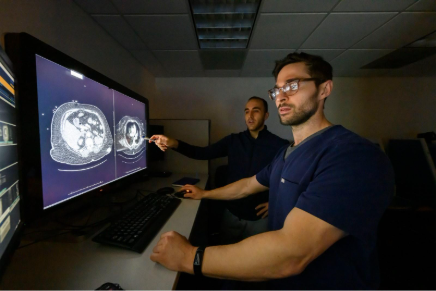Call / Moonlighting

Call
During their time at Corewell Health William Beaumont University Hospital, residents will be exposed to various types of call outside their normal workday duties. In the second half of the R3 year, residents are excused from call duties to allow for ABR Core exam preparation.
- As an R1, generals call takes place 1-2 times per month on weekends from 8A-4P, where residents read chest/abdomen/MSK plain films with an occasional fluoroscopy study
- Starting at the end of R1 year, emergency department call takes place approximately 3 times per month, weekdays from 4:30P-9P and weekends from 4P-9P, where residents read CT/US/XR from one of the busiest emergency departments in the nation. All modalities with the exception of MR are read during this shift, with 24/7 coverage by dedicated attending emergency radiologists. These shifts run concurrently with scanner contrast coverage duties and are reimbursed
- Starting R2 year, weekend inpatient CT call takes place approximately 1 time per month from 8A-4P, where residents read inpatient and emergency department body CT and US studies, with an occasional image guided abscess aspiration/drainage procedure. These shifts are reimbursed
- Starting in the second half of R2 year, “Midnights” takes place in 1-week blocks, for a total of approximately 5 throughout the R2 and R3 years, from 9P-7A, where residents read both Emergency Department cases as well as inpatient STAT studies from the Royal Oak, Troy, and Grosse Pointe campuses and Lenox Emergency Center. Evening and overnight coverage is provided by dedicated attending emergency radiologists
- IR call for diagnostic radiology residents is contained within the resident’s dedicated IR block and consists of approximately 4-5 shifts per month of home pager call, from 5P-7A the following day, with a call-in rate of approximately 20%. Residents also have 1-2 weekends of 7A-5P in-house consults and 5P-7A pager call, with a call-in rate of approximately 25%
Moonlighting
The diagnostic radiology residency at Corewell Health William Beaumont University Hospital has extensive opportunities to moonlight throughout the four years of training. Both weekend and weekday shifts are available for coverage of potential contrast reactions in patients undergoing contrast-enhanced imaging studies. These shifts are available at the Sterling Heights, Macomb, and West Bloomfield campuses.
- Additional reading shifts are also available on weekday evenings and weekends, providing excellent opportunities for additional experience
- Weekday inpatient CT moonlighting takes place from 4:30P-9P, where residents read inpatient CT and US studies, with an occasional image guided abscess aspiration/drainage procedure. As soon as the resident has completed a CT and US rotation in R1 year, they are eligible to take these shifts
- Weekend inpatient CT moonlighting takes place from 4P-9P, where residents read inpatient CT and US studies
- Weekend outpatient neuro moonlighting takes place from 7A-4P, where residents cover contrast reactions in the imaging center and read off the outpatient neuro CT/MR list. As soon as the resident has completed a Neuro rotation in R1 year, they are eligible to take these shifts
- Weekend inpatient neuro moonlighting takes place from 7A-4P, where residents read primarily the CT studies from the ED, as well as some inpatient MR if able. As soon as the resident has completed a Neuro rotation in R1 year, they are eligible to take these shifts
- Weekday and weekend neuro IR shifts take place from 4P-7A, where residents hold the pager for stroke calls and are responsible for seeing and consenting the patient, writing a note, and assisting with the procedure, with a call-in rate of less than 20%
Moonlighting shift selection is based on seniority, with first claim given to the R4 class. However, due to the abundance of moonlighting available, multiple shifts are typically given to the R1 class every month.

